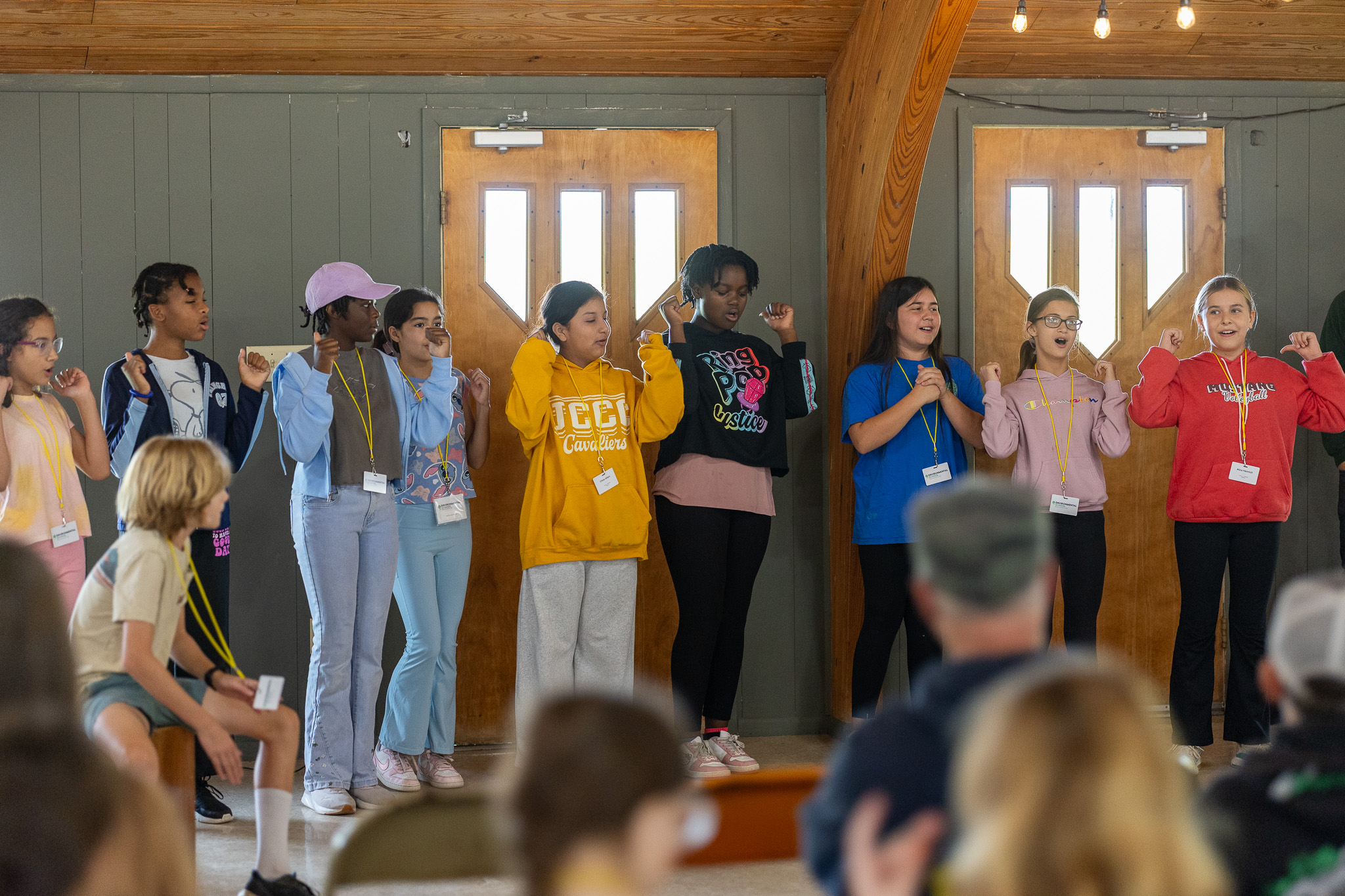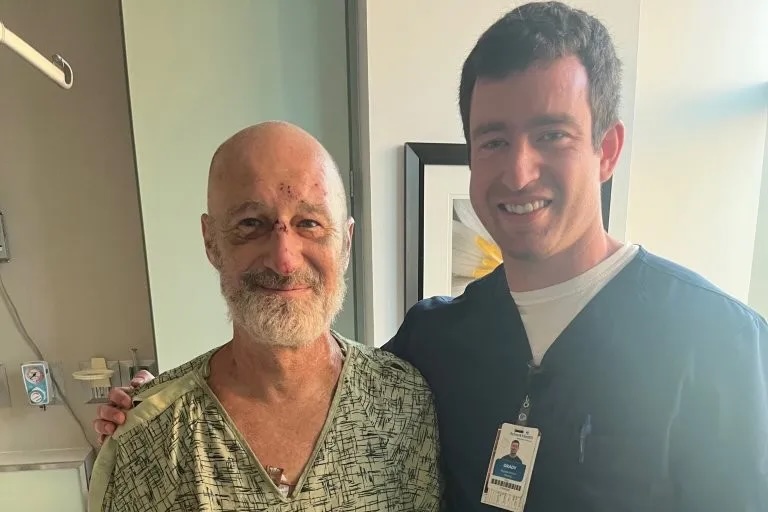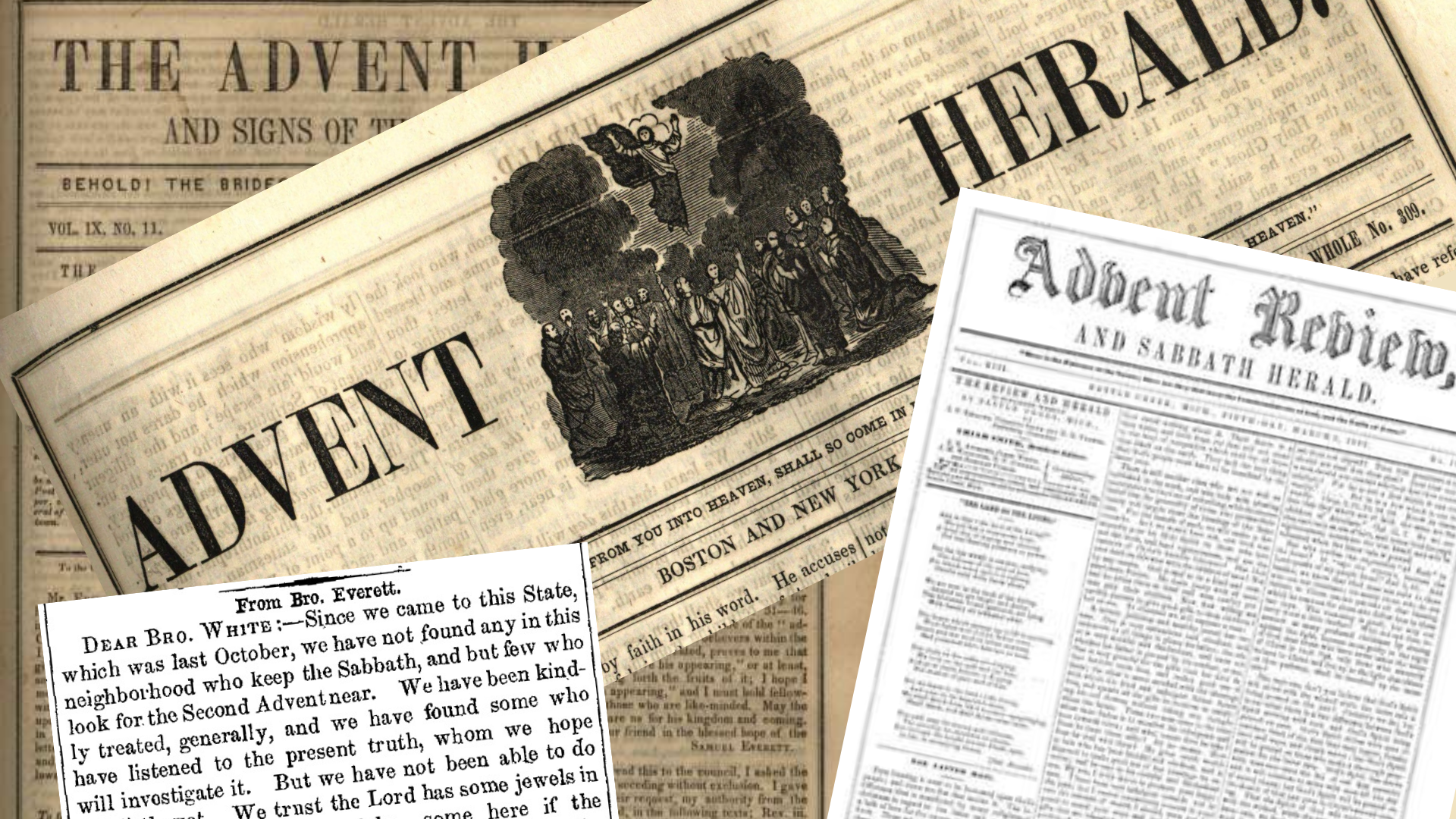Adventist News
 OUTLOOK Announces Winners of the 4th Annual Student Essay Contest
Hugh Davis – January 20, 2026
OUTLOOK Announces Winners of the 4th Annual Student Essay Contest
Hugh Davis – January 20, 2026
OUTLOOK magazine is happy to announce the winners of its 4th Annual Student Essay Contest, which highlights the voices and experiences of Adventist students across the Mid-America Union. This year was an exciting step forward for the contest. We received 16 student submissions from four conferences, an increase from last year. It was also the first year middle school students were invited to participate, giving even more young people the chance to share their stories. This Year’s Winners We are pleased to recognize the following students: 1st Place: Evie Lange – Campion Academy (Rocky Mountain Conference) 2nd Place: Isabella Becker – College View Academy (Kansas-Nebraska Conference) Middle School Winner: Eden Henton – College View Academy (Kansas-Nebraska Conference) Each winner received scholarship support, an Amazon gift card, and a framed copy of their published article. The 1st- and 2nd-place essays are featured in the January issue of OUTLOOK and are available on our website. Other selected student essays will also be shared online and in future issues throughout the year. Thank You to Our Teachers We would like to thank the teachers who partnered with us to make this contest possible. We are grateful for your commitment to Adventist education and student storytelling. Looking Ahead: 5th Annual Student Writers Contest The 5th annual contest will be renamed the LouAnn Howard Student Essay Contest. This name change honors LouAnn Howard, who served more than 47 years in Seventh-day Adventist education as a teacher, leader, and advocate for students. While the name will change, the purpose of the contest will remain the same—to encourage students to share their stories and reflect on the impact of Adventist education. The 2026 Student Writers Contest will take place later this year, and we hope you’ll take part! If you would like to be informed when the contest opens, please sign up for our newsletter at bit.ly/myoutlook — that’s the best way to receive official announcements and updates. As this new contest approaches, we encourage all students, staff, and teachers to continue in prayer as you pursue Something Better in Adventist education, for yourselves and for one another. About Seventh-day Adventist Education The Seventh-day Adventist education system is one of the largest Christian school systems in the world, second only to the Roman Catholic Church’s system. It includes more than 7,500 schools in nearly 150 countries, serving about 1.5 million students with a strong focus on faith, academic growth, and service to others. Adventist schools help students grow spiritually, academically, socially, and physically so they can live meaningful lives and make a positive impact in their communities and the world.
Read more... From the Philippines to Pierre Pastor Burrows begins ministry in South Dakota
Jodi Dossenko – January 12, 2026
From the Philippines to Pierre Pastor Burrows begins ministry in South Dakota
Jodi Dossenko – January 12, 2026
The Dakota Conference is pleased to welcome Pastor Andrew Burrows as the new pastor for the Pierre and Bowdle Seventh-day Adventist churches in South Dakota. Pastor Burrows brings with him a rich and diverse background in both life and ministry. Born and raised in a Seventh-day Adventist home on the East Coast, he attended Highland View Academy in Hagerstown, Maryland. After initially studying theology at Andrews University, he shifted paths and joined the U.S. Marine Corps, serving for 10 years until a medical retirement in 2002. Following a personal conversion at age 35, Pastor Burrows began a new chapter. At 40, he returned to school and completed his bachelor’s, master’s and doctoral degrees in ministry and leadership at Adventist institutions in the Philippines. His doctoral dissertation focused on mentoring strategies within the Adventist Ambassador youth program. He met his wife, Cherryl, in the Philippines. She holds an MBA with emphases in finance and management. Their son, Andrew, recently turned eight and is currently attending an Adventist school while the family awaits visa approval to join Pastor Burrows in the U.S. His ministry began overseas, serving in multi-church districts and overseeing church construction projects. His mission statement captures his heart for service: “A simple clay pot, tossed and broken upon the Rock, made new again, used to give living water to those who thirst.” While new to the Dakotas, Pastor Burrows is no stranger to new places—South Dakota is the 12th state he has called home, in addition to living in four other countries. He is now settling into his home in Pierre and embracing this new season of ministry. “I’m excited to serve and to share Christ’s love,” he said. “God has been faithful in leading, and I’m eager to see what He has in store here.” With a heart for mentorship, evangelism and spiritual growth, Pastor Burrows looks forward to connecting with members across the Pierre-Bowdle district and continuing his journey of ministry in the Dakotas. Written by Jodi Dossenko, communication director for the Dakota Conference, based on an interview with Pastor Andrew Burrows. Draft edited and refined with the assistance of ChatGPT.
Read more... Retreat Speakers Tell Singles “You Belong”
Guest Contributor – January 12, 2026
Retreat Speakers Tell Singles “You Belong”
Guest Contributor – January 12, 2026
It started as a dream to create a spiritual space for single believers in Minnesota and grew into a living testimony of God’s faithfulness. Our first Singles Spiritual Retreat took place last August and proved to be more than just a gathering. Under the guidance of conference family life ministry coordinator Eduardo Jacobo, this initiative blossomed into a reality that left participants filled with joy. The retreat was prayerfully planned and led by Pastor Jude Senatus and a dedicated team of volunteers, including Becky Porter, Choolwe Luya, Robert Nguru, Chipo Monga, and many others. Mutinta Dewa and her team led out in creating vibrant, welcoming décor for the retreat. Attendees traveled from across Minnesota and even Wisconsin, eager to fellowship and experience an atmosphere filled with warmth and belonging. For many singles in our churches, this retreat offered something long overdue: a space where they were not overlooked or pushed aside but embraced as valued members of the body of Christ. Dr. Senatus opened the day with a reminder that “singleness is not isolation but instead preparation.” Pastor Darnisha Thomas delivered the keynote message, Positioning to Flourish on Purpose. Pastor Rachel Hyman presented Dodging Dogs and Divas: Spotting Wolves in Designer Clothing, while Pastor Ezra Kenyanya spoke on Choosing Solitude Without Shame. Each talk resonated deeply. Participants said the messages were highly relevant and needed. The speakers’ words challenged hearts and brought healing and renewed purpose. At its core, this retreat was more than an event—it was a movement. It boldly declared that singles in our churches are not forgotten. They are not defined by what they lack but by who they are in Christ. The Minnesota Conference, through this retreat, sent a powerful message: you are not invisible. God sees you, we see you, and you belong here. Information provided by Jude Senatus “The church can make a welcoming place for single adults by celebrating their wins and who they are as a person. Affirm them by saying, ‘You are enough.’ Avoid the unsolicited matchmaking questions: ‘Why are you single?’ or ‘When are you getting married?’ (it’s awkward). Be intentional with inclusive language and activities as a church family. Empathize with their struggles of singlehood and avoid saying ‘Enjoy your singleness.’ Lastly, view them as adults and not children. Encourage them to share their expertise based on their ministry passions, such as children’s and youth ministry, deacon/deaconess ministry, music, mental health or education.” —Pastor Darnisha Thomas
Read more... Students Experience Classroom Without Walls
Guest Contributor – January 12, 2026
Students Experience Classroom Without Walls
Guest Contributor – January 12, 2026
Environmental school is a rite of passage in the Kansas-Nebraska Conference. Every year sixth graders from around the conference can attend environmental school at Broken Arrow Ranch where they learn about the outdoors, make new friends, and learn more about Jesus. Last fall 53 students from six schools and one home school attended environmental school at Broken Arrow Ranch in Kansas. It is an event that students look forward to for years and never forget. It is an opportunity to get out of the classroom to have fun with their friends and make new friends with students from other schools. There is an even greater purpose for environmental school. In the book, Education, Ellen White writes, “The book of nature, which spread its living lessons before them, afforded an exhaustless source of instruction and delight. On every leaf of the forest and stone of the mountains, in every shining star, in earth and sea and sky, God’s name was written” (31). Our students were delighted to learn from the book of nature. This week of learning in the book of nature would not be possible without the 18 adults, mostly volunteers, who invested a week of their time in making this learning experience happen. Students learned orienteering taught by Jeaneen Erickson, College View Academy teacher, videography taught by Saul Dominguez, Kansas-Nebraska Conference communication director, wilderness survival taught by Dr. Mary Burton, Wichita Adventist Christian Academy teacher, and wildlife taught by Megan Wehling, Midland Academy teacher. An exciting aspect of this experience is the mentoring that takes place between adult volunteers and the students. The volunteers come from a wide range of backgrounds and experiences, and the students benefit from these positive interactions. At the center of the experience was intentional time with Jesus each morning and evening. Pastor Nick Snell, Kansas-Nebraska Conference youth and young adult director, led the students in singing and presented meaningful and relevant worship talks every morning and evening. I am thankful for the financial support of our conference in making sure funds are available for this crucial experience in our territory. Jeff Bovee is education superintendent for the Kansas-Nebraska Conference.
Read more...
Blogs
 The Teacher’s Notes–Shining as Lights in the Night, Lesson 5 Adult Bible Study Guide, 20261Q, "Uniting Heaven and Earth--Christ in Philippians and Colossians"
The Teacher's Notes – January 24, 2026
The Teacher’s Notes–Shining as Lights in the Night, Lesson 5 Adult Bible Study Guide, 20261Q, "Uniting Heaven and Earth--Christ in Philippians and Colossians"
The Teacher's Notes – January 24, 2026
Sabbath School Lesson for January 24-30, 2026 Introduction on Lesson 5, Shining as Lights in the Night Memory Text: “Do all things without complaining and disputing, that you may become blameless and harmless, children of God without fault in the midst of a crooked and perverse generation, among whom you shine as lights in the world.” Philippians 2:14, 15 NKJV Jesus declared Himself to be the light of the world (John 8:12 and Isaiah 49:6). That was the mission given Him by the Father and affirmed by Paul in his letter to the Philippians. But we are called to be a light as well (Matthew 5:14). By surrendering our lives to Christ and developing a close walk with Him, we are able to reflect His light of love and mercy to those around us. This is the mission plan of God’s followers. He empowers us to do good works that glorify the Father in heaven (Matthew 5:16). Paul uses the theme and metaphor of light repeatedly in his letters to the churches. Working in unity with each other and with God, we can be instruments in lighting up this dark and perverse world today. People are touched by acts of kindness and by witnessing our grace and peace, even under hardship and suffering. Sunday: We Work Out What God Works In Monday: Light in a Dark World Tuesday: A Living Sacrifice Wednesday: Proven Character Thursday: “Hold Such Men in Esteem” Sunday: We Work Out What God Works In Many are perplexed by the words of Paul when he tells us to “work out our own salvation” (Philippians 2:12). Even the troubling words that follow, to do it “with fear and trembling”, makes many of us scratch our heads in confusion. Perhaps we can better understand the intent of these words if we continue reading the next verse, which reminds us that God is the One who works in us (Philippians 2:13). We work OUT our salvation by doing good works, but God works IN US, providing us with the power to do good works. It’s a team effort. We need to listen to God and follow His instructions. He guides us and provides us with the faith and strength to accomplish His mission. Paul made it clear in other verses that salvation is God’s work, we can do nothing to save ourselves, and even faith is a gift. His reminder to the Philippians was simply for them to work hard to show others the salvation they had been given. Humble, reverent obedience is the result of being saved. It is not faith AND works we are seeing in Paul’s letters, but one might understand the relationship better by seeing that it is faith THAT works. Works are the evidence of our faith. Verses and questions: Philippians 2:12, 13 What kind of work are we expected to do for God? How do we obey “with fear and trembling”? What does that mean to you? Romans 3:23, 24, 5:8, and Ephesians 2:8-10 How do these verses point out the work God plays in our salvation? What part do we play in our being saved? Monday: Light in a Dark World Try stargazing next time you are out camping, away from bright, artificial city lights. It’s amazing how many more stars you will see in the sky. In the same way, the darker the world becomes, the brighter God’s followers will shine. Our acts of goodness will stand out in stark contrast to the selfish, arrogant ways of the world. Paul told the Philippians how to shine. By not complaining and arguing with each other, their lights would shine brighter together, showing the world what Jesus had done for them through the Holy Spirit. Paul’s words in Philippians 2:15, telling them to be “blameless and harmless”, remind us that the world is watching how we conduct ourselves. We need to “hold fast to the word” if we are to fulfill God’s mission in such trying times (Philippians 2:16). Verses and questions: Philippians 2:14 How does not complaining or disputing with each other make us more unified? Philippians 2:15, 16 Why is unity of faith and practice so important in the last days? How can we shine as lights in the world? What ways of shining have worked well for you, and what else might you do to be able to shine brighter for Jesus? Tuesday: A Living Sacrifice Being a bearer of light to the world is a joyful experience, but often comes at a high cost. Paul felt that his life was being poured out to God as a drink offering (Philippians 2:17). Mary, likewise, poured out a liquid sacrifice, a costly amount of spikenard oil to anoint Jesus’ head and feet before His death. Surrendering to God is the same as becoming a living sacrifice, as Paul described in Romans 12:1, 2. We can be a sacrifice for God by spreading the gospel, such as the Philippians had done by opening their homes and studying the Scriptures with their neighbors. Early Christians, as well as our Adventist pioneers, were active participants in evangelism, pouring their lives into God’s work. They did not expect pastors and church leaders to do it all. There was also the possibility that one might be called to lose their life because of their faith, as Paul had fear would happen to him. Either way, Paul made it known that he was willing to serve God, no matter what sacrifice it required, his life or his death. Service and the sacrifice it required was never a burden to Paul. It was a joyful way to thank Jesus for His enormous sacrifice on the cross. Verses and questions: Philippians 2:17, 2 Timothy 4:6, Romans 12:1, 2, and 1 Corinthians 11:1 What kind of sacrifice can we be in the cause of God? How do we become the kind of sacrifice God desires? How can we remain joyful, even when extreme sacrifice is required of us? Wednesday: Proven Character <a class="cat-post-excerpt-more" href="https://www.outlookmag.org/the-teachers-notes-shining-as-lights-in-the-night-lesson-5/" title="Continue reading The Teacher’s Notes–Shining as Lights in the Night, Lesson 5 Adult Bible Study Guide, 20261Q, “Uniting Heaven and Earth–Christ in Philippians and Colossians”“>Read more…
Read more... I Tried These 5 Daily For Inflammation My Inflammation Decreased Significantly
Jeanine Qualls – January 21, 2026
I Tried These 5 Daily For Inflammation My Inflammation Decreased Significantly
Jeanine Qualls – January 21, 2026
https://youtu.be/R8IIzS2qyfg
Read more... Left to Grace
Guest Contributor – January 20, 2026
Left to Grace
Guest Contributor – January 20, 2026
One of the hardest things for most of us to do is rest. We work extra time to prove ourselves worthy of our paycheck. We sacrifice sleep to earn that elusive A+. We jump from one church event to the next. We run to and fro hoping to keep our homes, our families, communities and overall lives under control. Control, after all, is what we are often hoping to stay in, trusting that through control life will be everything we dream it to be. When things get out of control, and they inevitably do, we become restless, anxious and afraid. This is why slowing down and resting can be so scary. They feel like holding life too loosely, relinquishing control and inviting catastrophe. Yet, poet and farmer Wendell Berry reminds us of the lesson that God teaches us through nature: life grows best when it is left to grace. Whatever is foreseen in joy must be lived out from day to day. Vision held open in the darkness By our ten thousand days of work. Harvest will fill the barn; for that The hand must ache, the face must sweat. And yet no leaf or grain is filled By works of ours; the field is tilled And left to grace. That we may reap. Great work is done while we’re asleep. When we work well, a Sabbath mood Rests on our day, and finds it good. Oh, how my heartache and exhaustion I would avoid if I remembered that “great work is done” while I sleep. I can prepare the ground and plant the seeds, but no matter how hard I stare at the ground, I cannot make the seeds grow. Similarly, I can do my best at home or at work, but I cannot make these thrive long term. In his letter to the Colossians, Paul wrote the following: “For by Him all things were created that are in heaven and that are on earth, visible and invisible, whether thrones or dominions or principalities or powers. All things were created through Him and for Him. He is before all things, and in him all things hold together.” (Colossians 1:16-17) If I believe this, then I have to believe that before I try my best to “hold together” all things, He does. Simply said, as a Christian I am invited to believe that before I get out of bed and start working, my Creator is already at work. My job then, is not to desperately figure out day how to keep the world afloat, but rather to prayerfully recognize where God is at work and to partner with Him. Again, always with the recognition that I do not hold things together. He does. This, by the way, is why we keep the Sabbath. Not because it is a rule we keep in order to stay in control of our salvation, but an invitation we accept because we believe our lives can be “left to grace”. The grace of the Good Sower who works before and after we do, but even Him rests and delights himself in his good work: you and me. While the seeds of our labor sleep on the ground, we have two options: fret and worry restlessly, or trust in the generous grace of the Creator who promises us He will not fail to bring forth spring, and with it, the fruits of our labor. by Pastor Joel Navarro, Piedmont Park Seventh-day Adventist
Read more... Microaggressions and the Fruit of the Spirit: What Shapes What We Notice?
Hugh Davis – January 20, 2026
Microaggressions and the Fruit of the Spirit: What Shapes What We Notice?
Hugh Davis – January 20, 2026
In recent years, the term microaggressions has become more common in conversations about race, culture, and social justice. A microaggression is often described as a small comment or action that may not seem harmful on the surface, but over time causes hurt, exclusion, or discouragement. Some people are deeply concerned about these moments, while others struggle to understand why they matter at all. At the same time, Scripture gives us another framework for how we live and interact with others: the fruit of the Spirit. Galatians 5:22–23 tells us the fruit of the Spirit is “love, joy, peace, patience, kindness, goodness, faithfulness, gentleness, and self-control.” These are not just personal traits. They shape how we speak, how we listen, and how we treat others—especially when we disagree. This raises an important question: Could conversations about microaggressions and the fruit of the Spirit be looking at similar behaviors, but from different angles? And could this explain why some people are more sensitive to certain social issues—like poverty, injustice, or discrimination—while others are not? What We Notice Often Reflects What Shapes Us People tend to notice what they have experienced personally. Someone who has repeatedly felt ignored, stereotyped, or dismissed may be quicker to notice subtle behaviors that cause harm. For them, microaggressions are not “small things.” They are reminders of deeper wounds. Others may not have had those experiences. They may honestly believe they treat everyone well and feel confused or even defensive when told their words caused harm. Their concern may be focused elsewhere—on personal responsibility, fairness, or unity—rather than on the emotional impact of everyday interactions. Neither reaction automatically means someone lacks faith or compassion. But Scripture challenges all of us to grow in awareness. Philippians 2:4 says, “Let each of you look not only to his own interests, but also to the interests of others.” That includes paying attention to how our words land, not just how we intend them. The Fruit of the Spirit as a Heart Check This is where the fruit of the Spirit becomes especially helpful. The fruit is not about being politically correct or winning arguments. It is about allowing the Holy Spirit to shape our character. Love asks, How does this affect my neighbor? Kindness considers whether our words heal or harm. Gentleness slows us down before we dismiss someone’s pain. Self-control keeps us from reacting defensively when challenged. In this way, the fruit of the Spirit can serve as a heart check. Even if we do not fully agree on every social term or framework, we can still ask: Am I speaking in a way that reflects Christ? Am I willing to listen? Ellen G. White wrote, “Christ’s method alone will give true success in reaching the people. The Savior mingled with men as one who desired their good” (Ministry of Healing, p. 143). Mingling requires attentiveness. It requires humility. It requires care in how we relate to others. Why Some Issues Feel More Urgent Than Others This also helps explain why people feel differently about issues like poverty, racial injustice, or social inequality. For some, these issues are personal and immediate. For others, they feel distant or abstract. Jesus consistently drew attention to those on the margins—the poor, the sick, the overlooked. Not because others did not matter, but because love naturally moves toward those who are hurting. When the Spirit shapes our hearts, our concern expands beyond ourselves. Micah 6:8 reminds us that God calls us “to act justly, and to love mercy, and to walk humbly with your God.” Justice, mercy, and humility all require us to notice things we might otherwise ignore. Moving Forward Together The goal is not to label one group as “right” and another as “wrong.” The goal is growth. As Christians, we are called to reflect Christ in a broken world. That means listening more, speaking with care, and being willing to learn—even when it feels uncomfortable. Whether we use the language of microaggressions or not, the fruit of the Spirit calls us to something deeper: a way of life that builds others up rather than tearing them down. When our hearts are shaped by the Spirit, we begin to notice what Jesus notices. And that may be the first step toward understanding one another—and serving our world—with greater grace. By Hugh Davis (with AI-assisted research and drafting)
Read more...
Featured Stories
 AdventHealth and South Metro Fire Rescue Bring Lifesaving Blood Program to the Community
AdventHealth – January 26, 2026
AdventHealth and South Metro Fire Rescue Bring Lifesaving Blood Program to the Community
AdventHealth – January 26, 2026
Last fall, South Metro Fire Rescue (SMFR) and AdventHealth Parker launched a groundbreaking collaboration to ensure trauma patients receive lifesaving blood transfusions before ever reaching the hospital. This partnership, one of the first of its kind in Colorado, is setting a new standard for emergency medical care and community benefit. This initiative equips EMS supervisors with two units of O-negative blood to give to patients in hemorrhagic shock. Some examples include traumatic injuries, gastrointestinal bleeds, or even pregnancy complications. The packed red blood cells are stored in advanced coolers with continuous temperature monitoring. If unused, the blood is returned to AdventHealth Parker’s blood bank within two weeks, ensuring zero waste. “Studies have shown that hemorrhage or bleeding is a leading cause of potentially survivable prehospital death. Prehospital blood transfusions significantly reduce mortality risk. The sooner the patient can receive blood, the more lives can be saved,” said Kelly Jung, regional director of trauma and EMS for AdventHealth in the Rocky Mountain Region. The program is funded through the AdventHealth Parker Foundation and is available to all patients transported by SMFR, regardless of whether they are taken to an AdventHealth hospital. Thanks to the support from the Foundation, it means patients will not incur any additional bills for the treatment. “This initiative is entirely supported through philanthropy. Our goal is to bring the best opportunity to have lifesaving blood prior to arriving at the hospital, saving critical time and increasing survival rates,” said Harmony Furlong, director of the AdventHealth Parker Foundation. This partnership was the brainchild of Jonathan Apfelbaum, MD, medical director for South Metro Fire Rescue and longtime emergency physician at AdventHealth Parker. He says the program represents years of data collection, advocacy and determination. “The data now shows that if we start blood within 30 minutes of injury, outcomes improve dramatically,” said Dr. Apfelbaum. “We looked at the evidence from similar blood programs in San Antonio, New Orleans, and Washington D.C. and they all showed fewer deaths, less blood needed overall, and shorter hospital stays when patients received a blood transfusion in the ambulance. We knew our community deserved this too.” This new program has the potential to help thousands of people in the Denver metro area. SMFR covers an impressive 300 square miles, and serves 600,000 people including those living in Parker, Highlands Ranch, Castle Pines, and Aurora. In the first month since the partnership launched, blood has already been used three times to help patients. “We’re proud to lead the way in the state,” said Jung. “As early adopters, we’re helping set a new standard of care in Colorado and across the nation. This is about giving our patients the very best chance at survival.” Thanks to the vision and dedication of SMFR, AdventHealth Parker, and their philanthropic supporters, more lives will have a fighting chance—before they ever reach the hospital doors. “I always tell my crews, take care of every patient as if they were your own family,” said Dr. Apfelbaum. “The whole goal is to do what’s best for our community.”
Read more... An Intersection of Fate and Faith The story of Kevin Rider
AdventHealth – January 19, 2026
An Intersection of Fate and Faith The story of Kevin Rider
AdventHealth – January 19, 2026
On August 21, 2025, Kevin Rider laced up his running shoes and headed out for his daily jog in Overland Park, Kansas. He deliberately chose busy areas over quiet streets or trails, a decision shaped by a traumatic cardiac arrest he suffered in 2021 while home alone. “Since then, I’ve always figured if I were to have another cardiac arrest, it’s better to be somewhere people can see you and help,” Rider said. As he paused at a familiar intersection to catch his breath and wait for the crosswalk signal, his prediction came true. Without warning, Rider collapsed. His heart had gone into ventricular fibrillation (V-Fib)—a life-threatening arrhythmia. The next thing he remembered was waking up in a hospital bed at AdventHealth Shawnee Mission with broken ribs and a fractured sternum. “Feeling the pain in my ribs and sternum, I knew someone had performed CPR,” said Rider, who has extensive training in medicine and science. “Whoever it was, they fought hard to keep me alive.” That someone was Grady Lenihan, an ICU nurse. Lenihan and a friend, also a nurse, were nearby when they came across a group of people surrounding an unresponsive man. They immediately began CPR, taking turns for nearly 10 minutes until EMS arrived. “My friend and I saw this man laying unresponsive on the sidewalk with some bystanders,” said Lenihan. “We pulled over to help and initiated CPR shortly after. Not knowing how long he was down, I was pessimistic about a favorable outcome; but that didn’t stop us from doing all we can.” Rider was transported to AdventHealth Shawnee Mission where he underwent a pacemaker procedure in the Cardiac Care Unit (CCU). Days later, while recovering, Rider experienced a powerful moment. An AdventHealth Shawnee Mission nurse floated to the unit from the ICU and walked into his room. As fate would have it, it was Lenihan, the very person who had helped save his life. Overwhelmed with this coincidence, Rider asked to take a photo with him and expressed heartfelt gratitude. His family, including his seven children, was deeply moved by the reunion. “It was a surreal and emotional moment seeing Kevin in the hospital conscious, standing up, talking and meeting his kids. It will be something I will never forget,” said Lenihan. “I think this story is a good example of the importance of knowing CPR and being good citizen, neighbor and friend in the community.” Recalling his 2021 cardiac arrest when he was alone, Rider said that due to the time it took to get him the help he needed, it left him in a three-week coma, with organ failure and memory loss. Though he recovered, he continued to live with kidney disease, battled onset prostate cancer and was left with a scar on his heart—believed to have contributed to this second cardiac event. “I personally know what happens when cardiac arrest goes untreated,” Rider said. “Had Grady and his friend not acted so quickly, I wouldn’t be here today.” Rider said he felt at peace being at AdventHealth Shawnee Mission. From the nurses to the physicians, he felt the care was exceptional. “You can tell this is a place of faith,” he said. In that CCU room, two lives intersected again—not at a crosswalk, but in a place where healing and humanity meet. Kevin Rider’s story is one of survival and serendipity. Thanks to the swift actions of a compassionate bystander who knew the importance of CPR and Rider’s own resilience, it’s a story that continues.
Read more... Samuel Everett: Baptist, Millerite, Adventist, Independent The Advent Review and Sabbath Herald’s first correspondent from Iowa.
Adventist Historical Footprints – January 12, 2026
Samuel Everett: Baptist, Millerite, Adventist, Independent The Advent Review and Sabbath Herald’s first correspondent from Iowa.
Adventist Historical Footprints – January 12, 2026
In 2026 I will be exploring early Sabbatarian Adventists in the states that now comprise the Mid-America Union. There is no way to know who the first Millerite or Adventist was in each state. Instead, I will feature the first people to write to the Advent Review and Sabbath Herald (forerunner of the Adventist Review) from the territories or states in what is now the Mid-America Union. Baptist Minister Samuel Everett was a third cousin, once removed to Edward Everett, the famous politician and orator who spoke before Abraham Lincoln at the dedication of the Gettysburg Cemetery National Cemetery on November 19, 1863. The author Edward Everett Hale was his fourth cousin. Samuel Everett, however, lived a humbler life than those of his more exalted relatives. Born on October 11, 1793, in Princeton, Massachusetts, to Joshua Everett and Ruth Wood, Samuel Everett experienced a conversion to Christianity in 1818 after which he felt the call to ministry. He attended the Baptist college in Waterville, Maine, where he enrolled in theology classes. (Then known as Waterville College, it became Colby College in 1867.) Everett graduated in 1823. By the time he married Lucinda Keyes* (September 14, 1798-January 9, 1868), in his home town of Princeton, Massachusetts, on February 9, 1825, he was the pastor of a Baptist congregation in Milford, New Hampshire. While in Milford, Everett was ordained and the couple’s first three children were born. In 1832, Everett was called to the church in Salisbury, New Hampshire. Three more children joined the family there. Everett became the Baptist minister in Holden, Massachusetts, in 1838, and a little more than a year later the family moved to North Leverett, Massachusetts, where they remained until 1852. From Millerite to Sabbatarian Adventist In early 1843 Samuel Everett joined the Millerite movement, accompanied by at least his wife and daughter. By early 1845, he was in conflict with his Baptist congregation and denominational leadership. The immediate flashpoint was Everett’s officiation of an open communion service in which unbaptized attendees were invited to participate. When Baptist leadership sought to discipline him, he “seceded” from the denomination. His stated reasons were that the Baptists had become proud and worldly in their wealth and increasing numbers. They resisted reform, and he no longer agreed with Baptist teaching in regard to eschatology and Jesus’ second advent. I joined the Baptist church from choice and from a conviction of duty, and I left it from a conviction of duty. I could never again join any church in its imperfect state on earth, where the right of secession for conscience sake is denied. The church was never intended to be a prison to the saints, but a voluntary company of brethren, bound together “in faith and love in Christ Jesus.”(“Secession”). Everett probably supported his family through farming, but curiously the 1850 U. S. Census still lists his occupation as a Baptist minister. According to the Millerite periodical, The Advent Herald and Morning Watch, he was involved in at least one weekend Bible conference of the many held in various homes during this period. Over a year after leaving the Baptist denomination, he was still concerned about the spiritual state of Advent believers who remained in organized denominations. We are glad to know that there are still some brethren who love the appearing of the Lord among our opponents…One, not long since, expressed the opinion that we have been hasty in seceding. I think not. We did not take such a course, till we saw that “the advent near” was rejected by them, as a body,—Even then, some of us waited for months, loth to leave and to give over our labors for their good. (Letter from Bro. S. Everett) Everett’s separation from the denomination for which he had labored so many years was difficult in many ways. Yet, his letters of the late 1840s call for a loving, brotherly spirit among the Advent believers. Everett did not give the seventh-day Sabbath as one of his reasons for leaving the Baptist denomination, but in April 1852, he wrote a letter to the Advent Review and Sabbath Herald outlining biblical support for it (“From Bro. Everett”). In July he announced that he would be meeting with seventh-day-keeping Advent believers in Bennington, New Hampshire, and Munsonville (probably in New Hampshire, although New York is a possibility, although there is no record of Everett preaching in New York) on two successive weekends in mid-summer. The next time Everett wrote to the Review, he, Lucinda, and their twelve-year-son, William Stillman (1837-1881), had moved to Iowa City, Iowa. Life in Iowa A desire to spread “present truth” seems to have been Everett’s motivation for moving to Iowa at the age of fifty-nine in October of 1852 (“From Bro. Everett”). In Massachusetts the Everetts left behind a host of family, friends, and acquaintances, including their oldest son, Samuel Pearce (or Pierce), and daughter, Lucinda Elizabeth (1829-1853) known as Elizabeth to avoid confusion with her mother. Three of their six children, Joshua Titus (1827-1846), Mary Jane (1832-1834), and George Boardman (1835-1836), had already died. Lucinda Elizabeth married Whitman Fiske Higgins in 1849, but died on July 5, 1853, before having any children of her own. Lucinda wrote a lengthy and touching tribute to her daughter, published in the Adventist Review and Sabbath Herald on October 11, 1853. Elizabeth’s death contributed to the great loneliness that her parents mentioned in their correspondence with the Review. Near the end of her tribute to Elizabeth, Lucinda wrote: The loss to us is great. We are a lonely family with but few to keep the Sabbath or tell of the coming of the Lord. We need much wisdom and grace; and I trust we shall have the sympathy and prayers of the brethren and sisters who may read these lines. We are waiting to hear what the Lord will speak to us, and what he would have us do (“From Sister Everett”). In 1856, about the time well-known Adventist families such <a class="cat-post-excerpt-more" href="https://www.outlookmag.org/samuel-everett-baptist-millerite-adventist-independent/" title="Continue reading Samuel Everett: Baptist, Millerite, Adventist, Independent The Advent Review and Sabbath Herald’s first correspondent from Iowa.“>Read more…
Read more... Learning in the Sand A teacher's perspective on a classroom sandbox
RMCNews – January 12, 2026
Learning in the Sand A teacher's perspective on a classroom sandbox
RMCNews – January 12, 2026
“Can we learn in the sand again today?” That’s the first question I hear every morning. And the answer for two weeks was yes! This year, our kindergarten classroom at Vista Ridge Academy in Erie, Colorado, transformed into something extraordinary: a classroom-sized sandbox where all our learning happened through hands-on, sensory-rich exploration. What began as a creative idea to help students engage their senses became one of the most joyful and faith-filled learning environments I’ve ever experienced. Each morning began with a prayer and a short worship thought—often beach or ocean- themed—reminding us that “God made everything, from the sand beneath our feet to the stars above our heads.” Then, the learning begins. On the day pictured here, we explored the letter D for dolphins, dig and discover. Students used shovels and buckets to build sandcastles and trace the letter D in the sand on top. Then they began adding more castles and letters to form words such as dad, dot and had. After blending words together, the pre-K students visited our classroom, and we began digging for dinosaurs. As we worked, we practiced our letter sounds: “D says /d/, like dinosaurs digging deep!” The sandbox became a joyful place of learning and laughter as children connected their phonics practice to real-world textures and play. When we gathered at the end of class, one kindergarten student summed it up perfectly: “I love working in the sand because it feels like we get to play all day, and learning is fun!” Each day, I watched my students grow more confident—not only in reading and writing but also in gratitude. Our sandbox wasn’t just about phonics. We used it for Bible stories, math concepts, social studies and science units about the ocean. Every subject becomes an adventure when students can dig, build and discover with their own hands. Kindergarten parent Alba Santos was thrilled for her daughter to have this experience saying, “I was so happy my child could experience something different in the classroom. She was excited to come to school every day and loved learning interesting facts about ocean animals.” Through this experience, I’ve seen students grow in cooperation, curiosity and gratitude. They weren’t just learning about God’s creation, they were learning within it. As Beach Week came to a joyful close, the kindergarten students gathered for a celebration of learning and praise. The classroom shimmered like a seaside festival, with students singing cheerful songs about the continents and oceans, proudly sharing what they had discovered about God’s world. Laughter and music filled the air as each child stepped forward, dressed as a colorful sea creature—from lobster to jellyfish—and confidently shared fun facts they had memorized. The culmination party was more than a performance; it was a reflection of two weeks spent learning through wonder, creativity and faith. With sandy hands and shining eyes, students celebrated not just what they learned, but the God who made it all. Mathias Gallaher is the kindergarten teacher at Vista Ridge Academy.
Read more...



